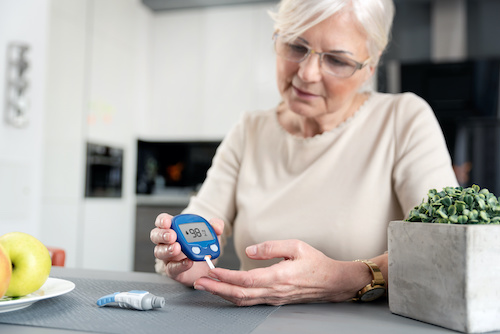Caring for a loved one with diabetes is more common than people think. According to the American Diabetes Association, over 10% of the United States population had diabetes in 2018, which equates to more than 34 million people. Uncontrolled diabetes can lead to serious complications, including heart attack, stroke, hearing impairments, kidney failure, and many more problems. Seniors often need assistance managing their diabetes, so here are some caregiver tips to consider.
Commit To Lifestyle Changes With Them
Eating a strict diet and committing to an exercise routine can be difficult for seniors, especially if it hasn’t been their normal lifestyle for many years. When caring for a loved one with diabetes, consider committing to lifestyle changes with them so they can see you’re thoroughly engaged with helping them manage it. That way, you can talk to them about the challenges of the new lifestyle and what you experienced that made the situation better. Knowing they aren’t alone can help make healthy habits easier to achieve.
Work To Manage Stress
High levels of stress can harm a person’s blood sugar levels. Find out what triggers stress in your senior loved one and work with them to manage it. If watching the news on television makes them feel stressed, then make sure they don’t watch it, and you can just give them important information they need to know. You may also suggest they participate in stress-relieving exercises like yoga or meditation or picking up a new hobby to focus their attention on other things.
Promote Self-Monitoring
Even when you’re primarily responsible for caring for a loved one, there will be times when you can’t be present. Self-monitoring is important for seniors with diabetes to track blood sugar levels and understand what is healthy and unhealthy for them. Promoting self-monitoring may mean helping them keep a journal of what they do throughout the day and then explain how they feel afterward. They may be able to identify particular stressors and eliminate them or realize that exercise makes them feel great and participate more.
Strategically Coordinate Physical Activities
Exercise is important even for seniors with diabetes. However, it may not be safe to exercise when your senior loved one’s blood sugar levels are low. The most ideal times to engage in physical activities are roughly an hour after eating a meal, which correlates to when blood sugar levels are at their highest. Just be sure to keep water, snacks, and glucose tablets handy when exercising in case they get overexerted.
Developing healthy habits doesn’t have to be difficult, but it does require some discipline. These caregiver tips can help make the process of managing a senior loved one’s diabetes easier, which can also give you some peace of mind. Caring for a loved one can be one of the most rewarding experiences of your life and can significantly increase their quality of life at the same time. If you would like more tips about how to improve your senior loved one’s quality of life, contact Next Day Access today.





